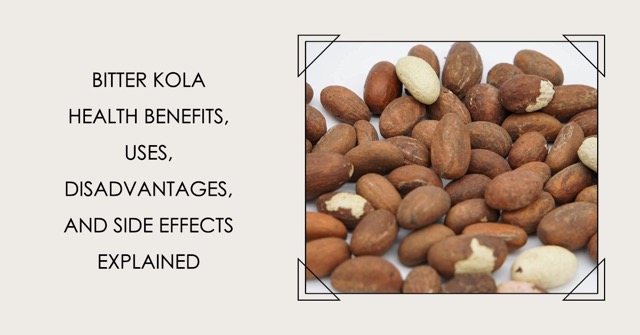Bitter kola (Garcinia kola) is a plant native to West and Central Africa.
It produces brown, nut-like seeds that have a bitter taste when chewed. Known for its various medicinal uses, bitter kola has been consumed for centuries in Nigeria, Ghana, Cameroon, and other African countries.
It is sometimes called a “wonder plant” due to its many purported benefits. However, excessive intake may also have risks and side effects.
This post will give you an overview of the potential pros and cons of using bitter kola.
We’ll explore the science behind its use in traditional African medicine - as an antimicrobial, antioxidant, and stimulant.
Special focus will be given to emerging research on how bitter kola may impact conditions like infertility, glaucoma, diabetes, and infections.
I’ll also objectively examine possible safety concerns like effects on the kidneys, liver, heart rate, and pregnant women.
Guidance will be provided on safe dosage levels. The goal is to educate readers on how to wisely harness the good while avoiding the bad when it comes to this powerful natural remedy.
Let's get to it...

Potential Benefits and Uses of Bitter Kola
Despite its potential side effects, bitter kola is valued in many parts of Africa for its wide range of purported benefits. Here is an overview of the main health-promoting properties of this plant:
- Antioxidant activity: Bitter kola contains several antioxidant compounds such as tannins, saponins, flavonoids, and polyphenols (Farombi 2000). These antioxidants help fight cell damage from free radicals and inflammation in the body.
- Antimicrobial effects: Extracts of bitter kola have shown antimicrobial activity against numerous microbes including bacteria, viruses, fungi and parasites (Adesanya 2017). This helps prevent and treat certain infections.
- Respiratory benefits: Bitter kola has been used traditionally to treat coughs, chest colds, and respiratory issues. It may help open airways, fight infection, and act as an expectorant to loosen mucus (Okhale 2015).
- Digestive aid: As a natural laxative and detoxifier, bitter kola can help relieve constipation, improve gut health, and support the liver and gallbladder (Adaramoye 2012).
- Metabolic effects: Bitter kola may help regulate blood sugar levels, improve lipid profiles, and boost metabolism according to some animal studies (Ahmed 2016). More research is needed to confirm effects in humans.
- Sexual performance: Traditional beliefs hold that bitter kola acts as an aphrodisiac and improves sexual desire and performance in both men and women. Some compounds may increase testosterone and improve blood flow.
- Snake repellant: Certain African tribes rub bitter kola on their skin or consume it orally to repel venomous snakes. The seed extracts appear to neutralize snake venom (Ademola 2013).
In summary, bitter kola has a wide array of traditional uses and biologically active properties that warrant further study. However, robust clinical trials in humans are still lacking for many applications.
Bitter Kola Combinations and Special Uses
In many parts of Africa, bitter kola is often used in combination with other natural substances to enhance efficacy or treat specific conditions. Here are some of the most common bitter kola mixtures and their traditional uses:
Bitter Kola and Honey
Combining bitter kola with raw, unprocessed honey is believed to provide additional benefits:
- May boost immunity, energy levels, and wound healing due to antioxidant and antimicrobial properties (Oyelami 2017)
- Soothes coughs, sore throats, and gastric ulcers through anti-inflammatory effects (Ebana 2016)
- Lowers severity of malaria symptoms when administered to patients (Okorondu 2011)
- Helps manage and prevent diabetes due to bitter kola's hypoglycemic properties (Ojiako 2018)
Bitter Kola and Garlic
Bitter kola is often mixed with garlic, which offers additional antimicrobial and cardiovascular benefits:
- May lower blood pressure, cholesterol, and blood sugar levels (Adaramoye 2012)
- Helps fight bacterial, fungal, and viral infections when combined (Lewis 2011)
- May help prevent heart disease, strokes, and thrombosis (Ried 2016)
- Relieves coughs, colds, sore throats, and chest congestion through synergistic effects
Other Special Uses
Some other unique applications of bitter kola include:
- Increasing sperm quality and count: Some Nigerian studies found bitter kola supplementation improved sperm parameters in males with infertility (Nwangwa 2012)
- Regulating menstrual flow: Bitter kola is believed to help stabilize hormones and alleviate menstrual symptoms like cramping (Ekeanyanwu 2010)
- Vision enhancement: Applying bitter kola extracts to the eyes may treat infections and glaucoma (Okhale 2015)
- Spiritual rituals: Used traditionally to ward off evil, attract prosperity, and induce prophetic dreams
More research is needed to substantiate many of these folk uses and applications of bitter kola. Consumers should exercise caution when ingesting bitter kola for specific medicinal purposes. Consult a doctor or traditional healer for guidance.
Potential Side Effects and Safety Concerns with Bitter Kola
While bitter kola is a popular traditional remedy in Western Africa, excessive consumption may cause adverse health effects. It's important to be aware of the following potential side effects and safety issues before using bitter kola:
- Liver toxicity: Several studies on rats found that high doses of bitter kola extracts for prolonged periods can raise liver enzymes and alter liver histology, indicating possible hepatotoxicity. However, human data is lacking, so the implications for occasional use in humans are unclear (Ogunlade 2021, Yamthe 2014). Those with existing liver conditions should exercise caution with bitter kola.
- Kidney effects: Some compounds in bitter kola may be nephrotoxic. Studies in rats showed impaired kidney function with consistent high-dose usage (Adaramoye 2012). Bitter kola may also alter electrolyte levels. Those with kidney disease should avoid bitter kola.
- Lowered blood pressure: Bitter kola may have hypotensive effects due to flavonoid contents. Those taking anti-hypertensive medications should monitor their blood pressure closely if using bitter kola (Adegbegi 2016).
- Headaches: Some people report headaches after consuming large amounts of bitter kola. Suspected mechanisms include caffeine-like effects or changes in blood vessels (Awolola 2003).
- Insomnia: The stimulant effects of bitter kola may make it more difficult to fall asleep, especially when taken in the evening.
- Irregular heartbeat: High doses of bitter kola may cause temporary heart rhythm abnormalities in sensitive individuals.
- Reactions: Allergies or intolerance may occur. Discontinue use if you experience hives, itching, abdominal pain, vomiting, or other concerning symptoms.
- Pregnancy risks: Due to lack of safety data, pregnant/nursing women should avoid bitter kola unless approved by a doctor. Bitter kola may stimulate uterine contractions (Ekeanyawu 2010).
In summary, while bitter kola is likely safe in small amounts, excessive intake may cause adverse health effects. Those with pre-existing conditions and pregnant women should exercise caution or avoid use altogether. As with any herbal supplement, it's wise to start slowly and watch for unusual reactions.
Conclusion: The Bittersweet Truth about Bitter Kola
In conclusion, bitter kola is a controversial natural supplement - both revered and feared in different parts of Africa. On one hand, it has demonstrated antioxidant, antimicrobial, and other beneficial bioactive properties in laboratory studies. However, conclusive clinical evidence for many of its traditional uses in humans is lacking.
While valued as a medicinal plant, bitter kola clearly comes with safety concerns and potential side effects. Excessive doses may negatively impact the liver, kidneys, heart, and other vital organs. Pregnant women, children under 12, and those on medications should avoid bitter kola unless approved by a healthcare provider.
For the general adult population, bitter kola appears relatively safe when used occasionally in moderation. However, little is known about its long-term effects with regular, high-dose usage. To enjoy the benefits while minimizing risks:
- Consult your doctor before using bitter kola medicinally, especially if you have any medical conditions
- Start slow - try just 1-2 segments per day then gradually increase if you tolerate it well
- Don't overdo it - limit intake to 3-4 segments per day maximum to avoid side effects
- Watch for reactions - discontinue use if you experience headache, insomnia, irregular heartbeat, or other concerning symptoms
- Buy from reputable sources - ensure you obtain pure, uncontaminated bitter kola. Beware of fakes or substitutes.
- Use as part of a balanced diet and lifestyle - don't view bitter kola as a cure-all or substitute for professional medical treatment
While this article aimed to explore the science behind the lore of bitter kola, plenty of mysteries remain. We hope this overview of bitter kola's benefits, risks, and proper usage provides a helpful starting point. Please share your own bitter kola experiences or knowledge to further enlighten and inform readers.
